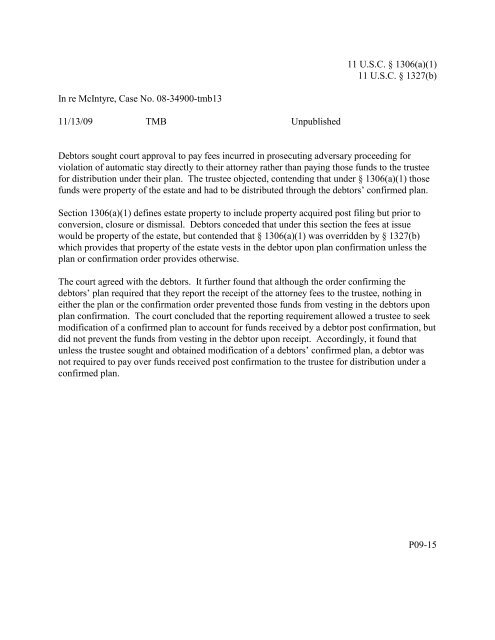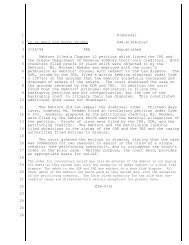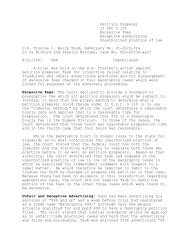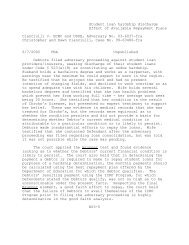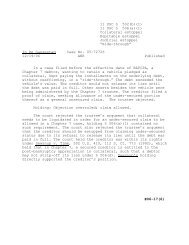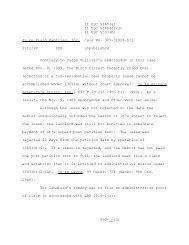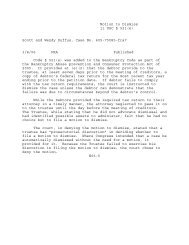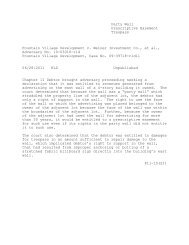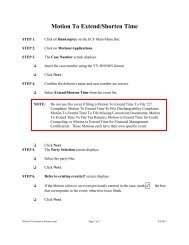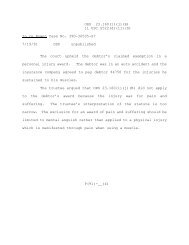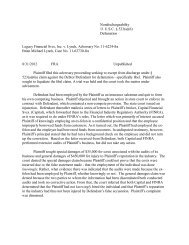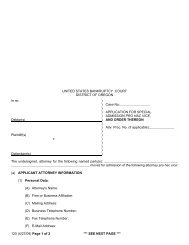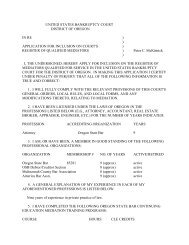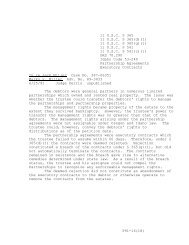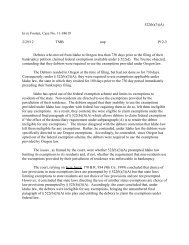11 USC § 1306(a)(1) - District of Oregon
11 USC § 1306(a)(1) - District of Oregon
11 USC § 1306(a)(1) - District of Oregon
Create successful ePaper yourself
Turn your PDF publications into a flip-book with our unique Google optimized e-Paper software.
<strong>11</strong> U.S.C. <strong>§</strong> <strong>1306</strong>(a)(1)<strong>11</strong> U.S.C. <strong>§</strong> 1327(b)In re McIntyre, Case No. 08-34900-tmb13<strong>11</strong>/13/09 TMB UnpublishedDebtors sought court approval to pay fees incurred in prosecuting adversary proceeding forviolation <strong>of</strong> automatic stay directly to their attorney rather than paying those funds to the trusteefor distribution under their plan. The trustee objected, contending that under <strong>§</strong> <strong>1306</strong>(a)(1) thosefunds were property <strong>of</strong> the estate and had to be distributed through the debtors’ confirmed plan.Section <strong>1306</strong>(a)(1) defines estate property to include property acquired post filing but prior toconversion, closure or dismissal. Debtors conceded that under this section the fees at issuewould be property <strong>of</strong> the estate, but contended that <strong>§</strong> <strong>1306</strong>(a)(1) was overridden by <strong>§</strong> 1327(b)which provides that property <strong>of</strong> the estate vests in the debtor upon plan confirmation unless theplan or confirmation order provides otherwise.The court agreed with the debtors. It further found that although the order confirming thedebtors’ plan required that they report the receipt <strong>of</strong> the attorney fees to the trustee, nothing ineither the plan or the confirmation order prevented those funds from vesting in the debtors uponplan confirmation. The court concluded that the reporting requirement allowed a trustee to seekmodification <strong>of</strong> a confirmed plan to account for funds received by a debtor post confirmation, butdid not prevent the funds from vesting in the debtor upon receipt. Accordingly, it found thatunless the trustee sought and obtained modification <strong>of</strong> a debtors’ confirmed plan, a debtor wasnot required to pay over funds received post confirmation to the trustee for distribution under aconfirmed plan.P09-15
Case 08-34900-tmb13 Doc 53 Filed <strong>11</strong>/13/09DISTRICT OF OREGONF I L E DNovember 13, 2009Clerk, U.S. Bankruptcy Court1Below is an Opinion <strong>of</strong> the Court.234567_____________________________TRISH M. BROWNU.S. Bankruptcy Judge8910<strong>11</strong>121314151617181920212223242526In reROBERT D. MCINTYRE andCHERYL D. MCINTYRE,UNITED STATES BANKRUPTCY COURTFOR THE DISTRICT OF OREGONDebtors.)))))Case No. 08-34900-tmb13MEMORANDUM OPINIONThis matter came before the court on the Debtors’ Motion to Pay Fees Direct and the Chapter 13Trustee’s objection to that motion. The Debtors were represented by M. Caroline Cantrell. The Chapter 13Trustee, Brian D. Lynch, (hereinafter the “Trustee”) appeared on his own behalf. In their motion, Debtorsseek permission to pay attorney fees received from a settlement agreement in an adversary proceedingdirectly to their attorney rather than paying those fees to the Trustee for distribution under their plan.I have reviewed my notes, the exhibits, and the pleadings and other submissions in the file. I alsohave read applicable legal authorities, both as cited to me and as located through my own research. I haveconsidered carefully the oral arguments presented and have read counsels’ submissions in detail. Thefollowing findings <strong>of</strong> fact and legal conclusions constitute the court's findings under Federal Rule <strong>of</strong> CivilProcedure 52(a), applicable in this proceeding under Federal Rule <strong>of</strong> Bankruptcy Procedure 9014. To theextent any findings <strong>of</strong> fact constitute conclusions <strong>of</strong> law, they are adopted as such. To the extent that any <strong>of</strong>the conclusions <strong>of</strong> law constitute findings <strong>of</strong> fact, they are adopted as such.Page 1 - MEMORANDUM OPINION
Case 08-34900-tmb13 Doc 53 Filed <strong>11</strong>/13/0912345678910<strong>11</strong>121314151617181920212223242526FACTSThe Debtors filed a Chapter 13 petition on September 19, 2008. Their first amended chapter 13 plandated October 21, 2008 (the “Plan”) was confirmed on December 2, 2008. Their confirmed plan requiredmonthly payments <strong>of</strong> $450 for 17 months with payments to increase thereafter to $690. In addition,paragraph 1 <strong>of</strong> the Plan required that Debtors pay to the Trustee the proceeds <strong>of</strong> any avoided transfers and allnet tax refunds received by them during the first 36 months <strong>of</strong> the Plan that were attributable to either pre orpost petition tax years.On February 12, 2009, the Debtors filed an adversary proceeding against Bank <strong>of</strong> America, N.A.(“B <strong>of</strong> A”). The complaint alleged that B <strong>of</strong> A engaged in post petition collection actions, both prior to andafter confirmation <strong>of</strong> the Plan, in violation <strong>of</strong> the automatic stay. In the adversary proceeding, Debtorssought punitive and emotional distress damages as well as attorney fees and costs incurred in prosecution <strong>of</strong>the adversary proceeding.The Debtors settled their adversary proceeding against B <strong>of</strong> A on April 24, 2009, and executed aSettlement Agreement and Release (hereinafter the “Settlement Agreement”) in June 2009. Under theSettlement Agreement, which contained a confidentiality clause, B <strong>of</strong> A agreed to pay damages to theDebtors. B <strong>of</strong> A also agreed to pay Debtors’ attorney’s fees incurred in the adversary proceeding. Debtors’counsel is holding that portion <strong>of</strong> the settlement attributable to attorney fees is her trust account.On July 8, 2009, Debtors filed a Motion for Fee Approval in which they contended that the adversarycomplaint was “outside <strong>of</strong> the attorney fees associated with debtor’s [sic] Chapter 13 bankruptcy; therefore,it is not necessary to forward the funds to the trustee and then be required to apply for the fees through thebankruptcy court.” Trustee objected to that motion, contending that Debtors’ counsel was required to applyfor and obtain court approval for her attorney fees. I held a hearing on the Motion for Fee Approval duringwhich I directed the Debtors’ counsel to file an application for attorney fees.Debtors’ counsel filed a fee itemization on August <strong>11</strong>, 2009, together with this Motion to Pay FeesDirect. In her motion, she contends that “[t]he adversary complaint is based on a post petition violation <strong>of</strong>the automatic stay and not rooted in the bankruptcy case.” Accordingly, she contends, fees earned inPage 2 - MEMORANDUM OPINION
Case 08-34900-tmb13 Doc 53 Filed <strong>11</strong>/13/0912345678910<strong>11</strong>121314151617181920212223242526connection with that adversary proceeding need not be turned over to the Trustee for distribution. TheTrustee disagrees contending that the fees at issue are property <strong>of</strong> the bankruptcy estate and must bedistributed through the plan.DISCUSSIONTrustee cites <strong>§</strong> <strong>1306</strong> <strong>of</strong> the Bankruptcy Code. 1 This section provides, in pertinent part, that:“ (a) Property <strong>of</strong> the estate includes, in addition to the property specified in section 541 <strong>of</strong> thistitle—(1) all property <strong>of</strong> the kind specified in such section that the debtoracquires after the commencement <strong>of</strong> the case but before the case is closed,dismissed, or converted to a case under chapter 7, <strong>11</strong>, or 12 <strong>of</strong> this title,whichever occurs first; and. . .(b) Except as provided in a confirmed plan or order confirming a plan, the debtor shall remainin possession <strong>of</strong> all property <strong>of</strong> the estate.”The Debtors concede that under <strong>§</strong> <strong>1306</strong>, attorney fees received post petition in conjunction with thesettlement <strong>of</strong> an adversary proceeding would be property <strong>of</strong> the bankruptcy estate. However, they contendthat<strong>§</strong> <strong>1306</strong> is overridden by <strong>§</strong> 1327(b) which states:“Except as otherwise provided in the plan or the order confirming the plan, the confirmation<strong>of</strong> a plan vests all <strong>of</strong> the property <strong>of</strong> the estate in the debtor.”The Plan contains no express language reserving any assets for the estate. Nonetheless, this court haspreviously held that “two categories <strong>of</strong> chapter 13 estate assets are not revested in the debtor and are treatedas future earnings or income and committed to funding the plan: 1) avoided transfers, including fraudulentconveyances <strong>of</strong> the debtor, that are recovered during the life <strong>of</strong> the plan; and 2) prepetition and postpetitiontax refunds that are received by the debtor during the life <strong>of</strong> the plan.” In re Schiffman, 338 B.R. 422, 4271Unless otherwise stated, all references to “sections” refer to the Bankruptcy Code,<strong>11</strong> U.S.C. <strong>§</strong> 101 et seq.Page 3 - MEMORANDUM OPINION
Case 08-34900-tmb13 Doc 53 Filed <strong>11</strong>/13/0912345678910<strong>11</strong>121314151617181920212223(Bankr. D. Or. 2006). Nothing in the language <strong>of</strong> the Plan indicates that any other property is exempt fromthe revesting provisions <strong>of</strong> <strong>§</strong>1327(b).Under the Order Confirming Chapter 13 Plan and Resolving Motions (“the “OCP”) used in thisdistrict, debtors are required to advise the trustee if they obtain the right to receive funds or other propertyvalued in excess <strong>of</strong> $2,500.00. In addition, they must obtain the approval <strong>of</strong> either the trustee or the courtprior to using such funds. However, this language does not prevent the revesting provided for in <strong>§</strong> 1327(b).It merely requires that debtors report the funds to the trustee and request authorization to use them, eitherfrom the trustee or the court. The terms <strong>of</strong> the OCP insure that the trustee has full knowledge <strong>of</strong> a debtor’spost confirmation finances and allows him to seek modification <strong>of</strong> a debtor’s plan to account for any postconfirmation increases in income should he so desire. However, absent such modification, the funds do notbecome estate property and the debtors need not pay them over to the trustee.Here the Debtors complied with the terms <strong>of</strong> the OCP. They advised the Trustee <strong>of</strong> receipt <strong>of</strong> thesettlement proceeds. On August 17, 2009, they filed a second amended chapter 13 plan dated July 22, 2009,which specifically allowed them to keep the settlement proceeds to purchase a car. The Trustee did notobject to that plan. If Trustee wanted a portion <strong>of</strong> the funds received from the settlement, he could haveproposed his own modified plan or sought turnover <strong>of</strong> a portion <strong>of</strong> those funds in conjunction withconfirmation <strong>of</strong> the Debtors’ second amended plan. He did neither nor did he object to the fee itemization byDebtors’ counsel. Therefore, the funds at issue are not estate property and need not be paid over to theTrustee for distribution under the plan.cc:M. Caroline CantrellBrian D. Lynch###242526Page 4 - MEMORANDUM OPINION


